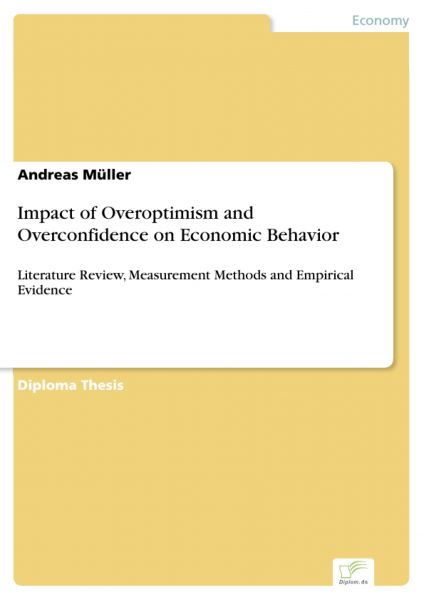Impact of Overoptimism and Overconfidence on Economic Behavior
Literature Review, Measurement Methods and Empirical Evidence
Inhaltsangabe:Introduction:
Economic theory normally focuses on rational agents optimizing individual utility. Since the second half of the 20th century, this viewpoint has been enriched by findings from the field of psychology. A new trait of research was created called “behavioral economics”. It takes into account subjective characteristics such as asymmetric preference and judgment, or limits of rational processing, willpower, and greed.
This paper aims to give an overview of two related human traits that have attracted particularly wide interest, namely overconfidence and overoptimism. The two are closely related to each other, and often used synonymously. Broadly speaking, overconfidence results in underestimation of future risks, e.g. the riskiness of future cash flows, whilst overoptimism leads to an overestimation of future positive outcomes, e.g. the future returns of a company. Besides, the paper wants to deduct suggestions for further research, by systematically identifying uncovered topics in existing literature.
Usually Alpert and Raiffa are credited with the first discovery of overconfidence. However, the most influential study is probably Russo and Schoemaker. It was published in the Sloan Management Review and communicated the topic to a broader audience for the first time. In particular, it revealed that assumingly rational managers were prone to overconfidence, too. This challenged traditional management doctrines and generated interest in a better understanding of the topic and further research. To exemplify overconfidence, Russo and Schoemaker asked managers to give numerical intervals for ten general-knowledge questions, such that nine out of the ten answers would be correct. On average participants included the correct value within their interval only 5 out of 10 times, i.e. they underestimated potential errors in their estimations.
Svenson is probably the most influential source regarding overoptimism. He made the subject intuitively understandable and established a standard measurement method that could be easily used for subsequent research. To give an example of overoptimism: Svenson asked students to compare their driving skills to those of their classmates. Roughly 80% believed they belonged to the top 50%, i.e. they overestimated their abilities.
This paper also provides a closer look at the empirical methods normally applied in field studies. Although the phenomena are intuitively understandable, empirical research […]
Inhaltsangabe:Introduction:
Economic theory normally focuses on rational agents optimizing individual utility. Since the second half of the 20th century, this viewpoint has been enriched by findings from the field of psychology. A new trait of research was created called “behavioral economics”. It takes into account subjective characteristics ...
Versandkostenfreie Lieferung! (eBook-Download)
Als Sofort-Download verfügbar
- Artikel-Nr.: SW9783956363030
- Artikelnummer SW9783956363030
-
Autor
Andreas Müller
- Verlag Diplom.de
- Seitenzahl 76
- Veröffentlichung 01.11.2007
- Barrierefreiheit
- ISBN 9783956363030
- Verlag Diplom.de

